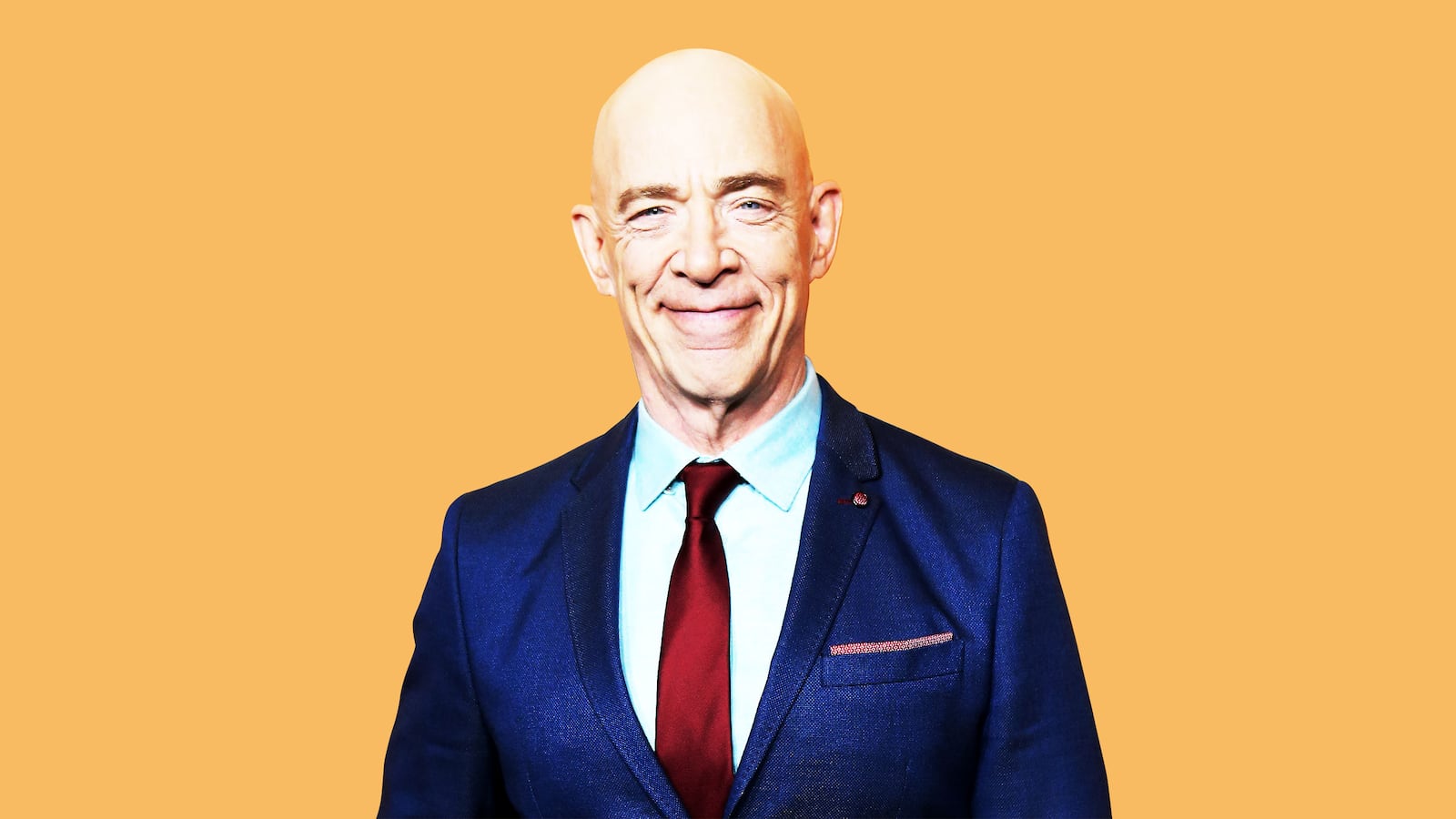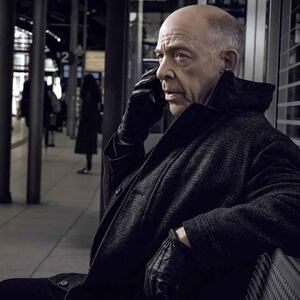The only thing better than one J.K. Simmons is two, which is a significant reason Counterpart is a top contender for best new show on television. After completing a sterling initial season earlier this year, Justin Marks’ twisty-turny sci-fi saga begins its excellent sophomore run on Starz this Sunday (Dec. 9). As before, its focus is squarely on Howard Silk (Simmons), a Berlin-situated government employee entangled in a Cold War-esque spy game—the catch being that the two sides at war are not East and West, but our world and an identical parallel dimension we discovered thirty years ago that’s populated by our exact doubles. Or rather, our almost exact doubles, given that in the three decades since first contact was made, the two realities (and their inhabitants) have diverged in unique ways. And thanks to a deadly flu that their world blames ours for creating, relations between them are less than cheery.
Think of it as Funeral at Berlin or Tinker, Tailor, Soldier, Spy, except that all the covert agents are literal doppelgangers. Delivering intricately knotty espionage thrills, Counterpart ended its maiden season with a terrorist attack that compelled our universe to cease contact with its replica. While bolstered by a terrific cast, Marks’ series is held together by Simmons, here playing dual roles as both our mild-mannered, good-hearted Howard and his ruthless, cunning twin, who in the premiere find themselves trapped in each other’s worlds, forced to acclimate to lives that they dislike and yet, to some extent, secretly covet. What ensues is more suspenseful drama rooted in questions of identity—how we become who we are, and whether we can ever fundamentally change—and Simmons brings those thematic concerns to bracing life via tour-de-force yin-yang performances.
With an Oscar (for 2014’s Whiplash) under his belt, the 63-year-old headliner embodies his Howards with a multifaceted three-dimensionality that immediately sells the show’s central conceit. In season two, with our Howard imprisoned by nefarious government forces, and their Howard sliding comfortably into his double’s shoes (and home) alongside his now-recovered wife Emily (Olivia Williams), Simmons continues to play both earnest and meek, and scheming and methodical, to brilliant effect. It may be his finest work to date—which is saying something, considering the star’s illustrious three-decade-long résumé. In anticipation of Counterpart’s impending return, we spoke with the renowned character actor about assuming leading man status for the show, whether everyone’s life is defined by crucial “divergence” points, and how Oz helped set TV on its current Golden Age path.
I assume because you’re playing two roles in Counterpart, they’re paying you twice, right?
[Laughs] I wish my agent had thought of that.
It seems only fair.
I’m definitely not going to cry poor [laughs].
How much of a challenge is it to embody these two identical, yet very dissimilar, Howard Silks?
It has been a challenge, which is a good thing to be presented with when you’ve been doing this as long as I have. Something new. It’s been a logistical challenge as well, but at the end of the day, I’m really playing two different characters in my mind. It kind of reminds me of the days back in New York in the late ‘90s when I would be on Law & Order playing the psychiatrist in the morning, and then I’d be on Oz playing the psychotic in the afternoon. It’s not exactly the same kind of set up, but it’s an interesting double duty.
Do you enjoy playing one of the Howards more than the other?
I find them both really interesting. I was initially drawn to the kinder, gentler Howard, because he was the first one I met reading the script. I certainly viewed him as the protagonist. But the more I play the more badass version of Howard, I do have fun. I get my opportunity to get my ya-yas out a little more with playing that character sometimes, especially when we get into action stuff.
After doing so much work in a supporting capacity, you’re clearly the star of Counterpart. Were you looking for a lead part, or was it simply a matter of opportunity?
It’s definitely the latter. Again, this is sort of to my agent’s chagrin sometimes—I’m definitely not looking to only play leading roles now for the rest of my career, just because some good things happened a few years ago. Counterpart came to me at a time when I was getting a lot of attention in the wake of Whiplash, and I think it’s one of those things that might not have come my way if not for the attention I was getting for Whiplash. So it’s been great to be perceived in new and interesting ways. I mean, that’s what most actors are hopeful of—that you don’t end up doing the same thing every time out, whether it’s a supporting part or a leading part. It’s just great to have the opportunity to do a variety of characters.
At least at the start of season two, the Howards are separated from each other, trapped in each other’s world. Has that made things a bit easier, because you don’t have to be both characters in a given scene?
It did simplify things. Of course, there were still days when you’re doing one character and then the other. Not to be a spoiler, but things will of course continue to develop as we go along in season two, so it may or may not remain that simple.
Simple is not a word I associate with Counterpart.
Yeah. Not only for my character, but for some other people as well. We’ll be seeing some really interesting counterpart characters.
What are the logistics of working opposite yourself—I’m thinking, for example, of the great showdown between the two Howards late in season one?
Fortunately, by the time we got to that scene—which I think was our eighth episode—we’d arrived at a way to shoot that where it was much more actor-friendly. My stand-in, John Funk, worked as hard as I did to learn both roles, and I was able to simply play the scene as one version of Howard with John playing across from me, and then we’d switch jackets and ties and do it the other way. So I wasn’t having to act with the invisible man or a tennis ball on a grip stand or anything. It really was, at the end of the day, much like playing any other scene, except that John Funk doesn’t get any of the glory because nobody will ever see his face.
The show is steeped in ideas about identity—who you are, how you come to be, and whether you can change yourself and/or start over. Did those concerns also initially draw you to the show?
That’s really what became a big part of the appeal. The initial appeal was just playing the kinder, gentler Howard, who I really empathized with. When I read anything, the first judgment I make is, do I think this is good, and well-written, and interesting, and smart and/or funny and/or whatever the genre might require? And then the second, equally important thing is, is this something that’s right for me as an actor? Something I can see and hear myself doing, and a character that I can see myself becoming? Then, when I realized this was two characters that I would have to wrap my brain around, it complicated the process but did make it that much more interesting.
And yeah, the central themes that the show investigates—the more Justin and I talked about it, the more and more fascinating it became to me.
Do you believe, like the show, that there are certain key moments in your life (i.e. “divergence” points) that, had they gone differently, would have made you a different person?
Oh, absolutely. And I think for most people, if you examine certain events in your life, you’ll find that there are those significant points. One in mine that I always point to is a job that I did not get as an actor, which was a crushing disappointment at the time. I was really crushed on every level, professionally and personally. As a result of not getting a job that I really, really wanted and felt I deserved, within weeks after that, my agent got me a different job, and it was that job which led me to meet my wife. So that’s my favorite example—our adorable children would not exist if I had not had what initially seemed to be a really bad disappointment.
Did Counterpart directly come about because of your Oscar win for Whiplash?
I never point-blank asked the question, but I’m sure the fact that I’d just won all those trophies, including the Oscar, was a big part of why Justin and Jordan [Horowitz] and Morten [Tyldum] thought they could sell a show with me as the leading character. If I didn’t have those awards on my shelf at home, it probably wouldn’t have come about. And you know, the best thing the Oscar and etc. have done for me is multiply the number of offers that have come my way in the last few years.
You co-starred in Oz back in the late ‘90s/early ‘00s, and after a lot of ensuing film work (and accolades), you’re now back on the small-screen. Have attitudes about TV changed in the intervening decades?
I think it’s interesting that you point out Oz, because I think Oz was absolutely a game-changer. People may or may not realize that Oz was the first original drama on what they used to refer to as “pay cable” back in those days, and really did break ground. I will always and forever thank Tom Fontana for that.
I think that was the beginning of this golden age of television, and yeah, the lines are absolutely blurred. Almost every actor that I’ve worked with in both television and film are either working in both, or open to working in both television and film at this point. Because there really is so much similarity in terms of the creative content. It used to be that film was thought of as more prestigious, but that has really become a thing of the past.
Was it daunting to sign onto a show like Counterpart, which is clearly envisioned as a multi-season series—or was that commitment, and the ability to explore the Howards in such depth, what made it so enticing?
It was both daunting and enticing—creatively and personally too. Because as we sat around the table when they asked me to be a part of this, one of the first things we discussed was the logistics of it, and my desire to be working at home in L.A., where I could see my family every day. That was sort of a condition of mine, that this should be based in L.A. The personal side of that worked out well, because I was looking at hopefully five, six or seven seasons of the show, which would enable me to have a life with my family at the same time, and also creatively, have the possibility of really delving into a character, or two characters in this case, over several episodes and hopefully several seasons.
That, to me, was a big part of the draw of this kind of show. With a feature film, the beginning, middle, and end are all there when you first sign on. And with a lot of more traditional network television series, it’s a procedural and it’s kind of the same from one week to the next. This, to me, was a great hybrid between television and film. It’s been everything I’d hoped it would be. It’s challenging, and it manages to keep my attention—which is more and more difficult to do these days [laughs].







